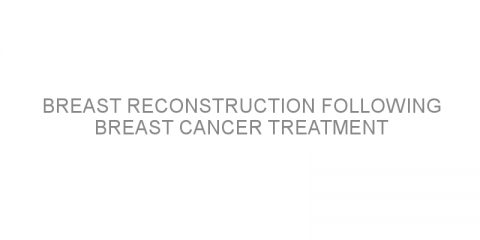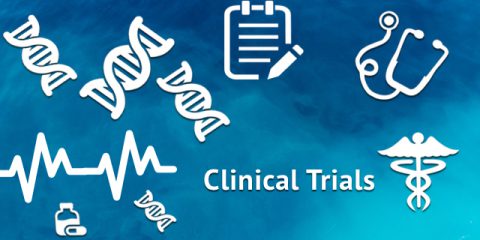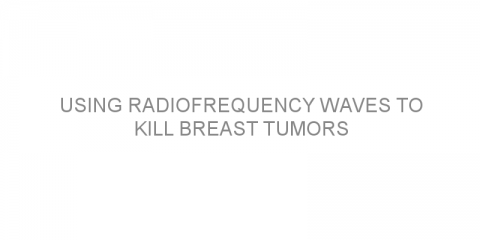In a nutshell This is a 2018 update on breast reconstruction following breast cancer treatment. It has been found that nearly 40% of women who undergo a mastectomy will have a breast reconstruction. Some background It was estimated that in 2017 106000 reconstructive breast surgeries were done. The main reason for this is to do with the psychological...
Read MoreBreast cancer Posts on Medivizor
Impact of muscle volume on breast cancer outcomes
In a nutshell This study analysed if the volume of muscle or the volume of fat in a patient with breast cancer had any impact on their survival. The study found that patients with breast cancer who had higher volumes of muscle survived better than patients with low volumes of muscle. Some background It is well known that obesity can have an...
Read MoreRadiofrequency Ablation and Surgery vs Lumpectomy for Breast Cancer Treatment.
In a nutshell This study investigated how safe radiofrequency ablation combined with surgery is in comparison to lumpectomy as a treatment for breast cancer. The study found that there was a higher likelihood of having no cancer left in the breast with radiofrequency ablation and surgery compared to lumpectomy. Some background Radiofrequency ablation...
Read MoreHow Vitamin D affects outcomes in breast cancer patients
In a nutshell This study looked at the impact of vitamin D levels in the blood on outcomes in patients with breast cancer after chemotherapy. The study found that patients with a vitamin D deficiency had worse outcomes, and in particular, the patients were more likely to have tumor cells left in the body after treatment. Some background The...
Read More“Your Life Depends on Your Own Advocacy”
“Always trust your gut. Don’t leave your treatment in the hands of someone that you don’t trust or that does not seem like a team player. Yes, they are all smart—even brilliant—but read, read, read, and question them at every corner and challenge the standard of care. Exercise, healthy eating, learning the ropes of insurance, mediation/prayer...
Read MoreLooking for patients with triple negative inoperable breast cancer to test a new treatment option atezolizumab
In a nutshell This trial is examining the effectiveness of atezolizumab (Tecentriq) when used with chemotherapy in patients with inoperable, recurrent triple-negative breast cancer. The main outcome to be measured will be the overall survival (time from treatment until death from any cause) of participants. The...
Read MoreLooking for patients with HER2 negative HR positive advanced breast cancer to test tesetaxel
In a nutshell This trial is examining the effectiveness of tesetaxel plus a reduced dose of capecitabine for hormone receptor (HR) positive/HER2 negative advanced breast cancer. The main outcome to be measured will be progression free survival (time from treatment until disease progression). The details Breast cancer is classified into...
Read MoreLooking for patients with triple negative breast cancer to test atezolizumab
In a nutshell This trial is examining the effectiveness of chemotherapy and atezolizumab (Tecentriq), given before surgery, for triple negative breast cancer. The main outcomes to be measured will be response in the breast tissue and lymph nodes and survival. The details Triple negative breast cancer is not dependent on the HER2 receptors or...
Read MoreLooking for women with metastatic breast cancer to evaluate whole, plant based diets
In a nutshell This trial is examining the effectiveness of a whole food diet for women with stable metastatic (spread) breast cancer currently undergoing treatment. The main outcomes to be measured will be the recruitment of patients approached, adherence to diet and change in symptoms and biomarkers. This study is being...
Read MoreClinical Trials Today
Prior to the 20th century, most people lived about 47 years in the developed world because of infectious diseases. In 1940, the first use of penicillin to treat infectious diseases occurred and penicillin became available in 1945 to the general public. Science and research conducted throughout the 1950s, 60s, and 70s, created more antibiotics so that life...
Read MoreUsing radiofrequency waves to kill breast tumors
In a nutshell This study looked how safe and effective it is to use radiofrequency ablation to kill off breast cancer tissue. The authors found that this treatment was very effective for smaller tumors but the effectiveness decreased as tumors increased in size. Some background Radiofrequency ablation is a medical procedure where pieces of tissue...
Read MoreBreast cancer treatment with Tamoxifen and its relation to Fatty Liver Disease
In a nutshell This study looked at the risk factors and protective factors surrounding non-alcoholic fatty liver disease in relation to tamoxifen (Novaldex) therapy for women with breast cancer. The authors found that a high BMI was a risk factor for tamoxifen related fatty liver disease, while exercise was a protective factor. Some background...
Read More









